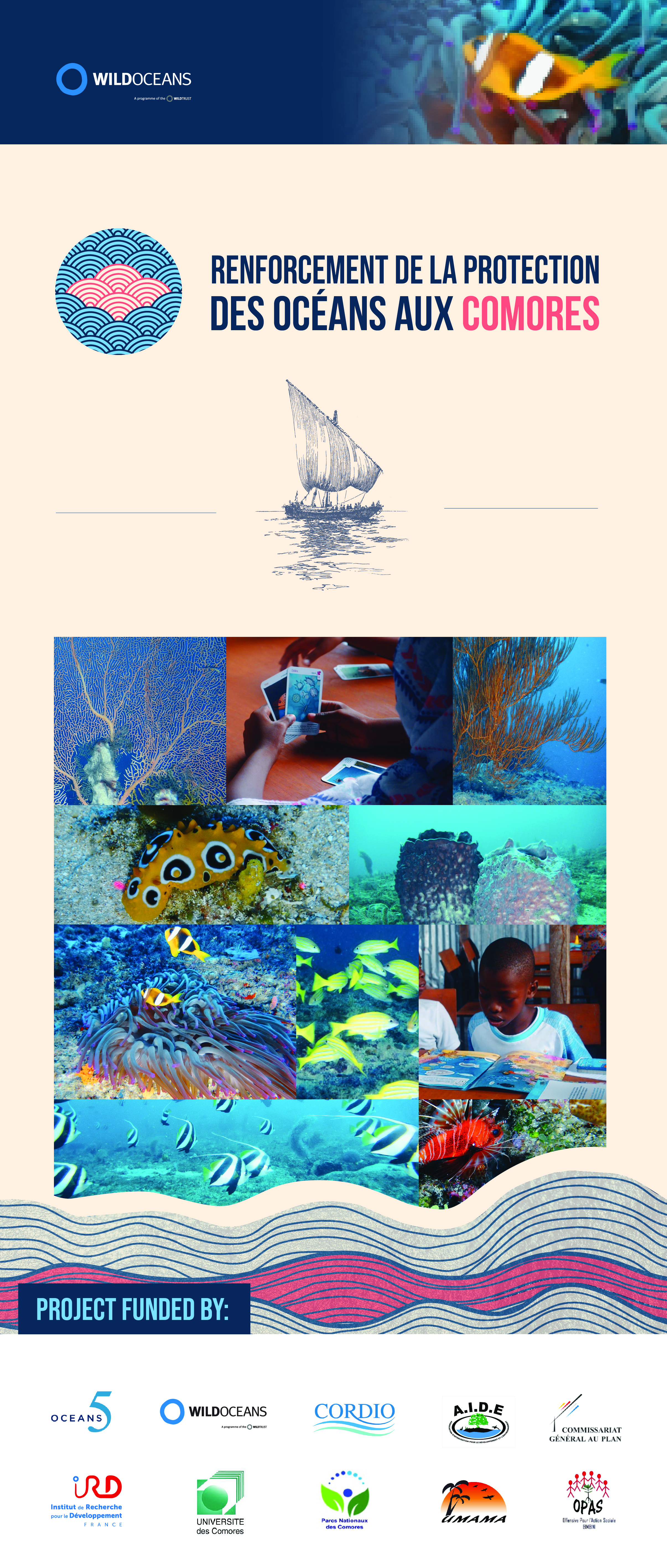

CONTEXTE L'archipel des Comores est au cœur d'un des hotspots mondiaux en matière de biodiversité. Cependant cette richesse est peu connue et devient de plus en plus menacée. C’est ainsi que le Fonds de partenariat pour les écosystèmes critiques (CEPF) a financé un projet ayant pour objectif d’améliorer les connaissances sur la biodiversité marine des Comores. Cela permettrait de mieux connaître les poissons, les éponges, les coraux profonds, ainsi que leur rôle dans le maintien des pêcheries côtières, tout en renforçant les capacités nationales en sciences marines, et en contribuant à la conservation de la biodiversité et à la gestion durable des pêcheries. Suite à l’expédition marine effectuée dans les eaux comoriennes en 2018, le traitement et l'analyse des données collectées sont en cours et les publications sont initiées. En 2019 et 2020, les organisations WILDTRUST-WILDOCEANS, CORDIO Afrique de l’Est et IRD avec ses partenaires locales à savoir l'Université des Comores et l’ONG AIDE Comores et l’Association UMAMA Anjouan, ont discuté des implications des résultats préliminaires de la recherche avec les acteurs concernés par le domaine de la pêche et de l'environnement. En outre, une session de sensibilisation aux récifs coralliens et de renforcement des capacités dédiée aux enseignants et aux formateurs a été organisée sur chacune des trois îles. Le développement des capacités des organisations locales de la société civile a fait l'objet d'une attention particulière au cours des six derniers mois. Les membres de trois organisations locales ont bénéficié d'un encadrement ciblé en matière de communication, d'administration de la recherche et de compétences organisationnelles. Ces activités ont inclus des sessions d'apprentissage interactif en ligne encadrées, la participation à des cours et des tâches, ainsi que le soutien à 2 chercheurs de l’Université des Comores dans la préparation de leur doctorat. Ainsi les conclusions de cette première étape serviront à lancer une nouvelle phase du projet visant à Améliorer les connaissances sur les ressources marines et leur gestion efficace. OBJECTIFS DU PROJET Les objectifs spécifiques su projet sont : 1. Sensibiliser à l’importance économique des aires marines protégées (AMPs) pour l’économie bleue nationale et faire la promotion des bienfaits dont peuvent bénéficier les communautés locales vivant à proximité des AMPs. 2. Renforcer les capacités techniques en matière de recherche et de formation liées au milieu marin. 3. Promouvoir et améliorer la mise en œuvre efficace des aires marines protégées. RESULTATS ATTENDUS Les résultats attendus sont : 1. Amélioration des connaissances sur les ressources marines de l’Union des Comores. 2. Formation de chercheurs de haut niveau sur les métiers de la mer et mis en place d’un Centre de ressources marines à la faculté des Sciences de l’Université des Comores. 3. Sensibilisation des communautés locales aux bienfaits procurés par les AMP et à la valeur des écosystèmes marins en bonne santé. 4. Identification des bénéfices et opportunités associés aux AMPs en termes d'amélioration les moyens de subsistance durables, et élaboration d'une demande de financement pour un soutien prolongé. 5. Participation constructive de la communauté à la gestion et au suivi de chacune des quatre AMPs côtières. De petites subventions seront octroyées à la faculté des Sciences de l’Université des Comores, à l’ONG AIDE et à l’Association Umama de Bimbini Anjouan pour la mise en œuvre de ce projet dont le lancement est prévu fin Janvier 2022.
 Francais
Francais  Anglais
Anglais 